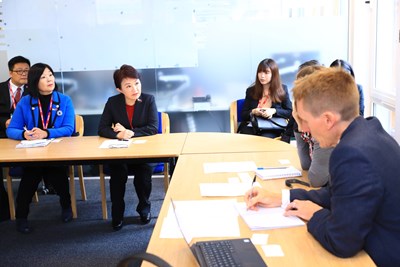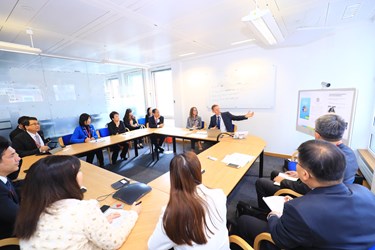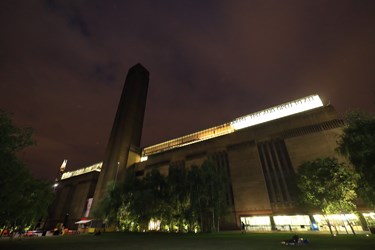
According to Mayor Lu, unabated coal power generation plants in the UK will gradually be phased out by 2025, therefore Taiwan should observe the global trend and rethink its energy policy in order to protect people's health.
Taichung Mayor Shiow-yen Lu led a delegation to visit the UK and the Netherlands from September 2 to 11 to study and learn from the administration experience of these countries. The delegates visited BEIS yesterday and were received by, International Climate Strategy Deputy Director Beth Child as well as International Climate Change and Energy – International Coal Energy Transformation Team Leader Matt Webb. Both parties engaged in dialogues and exchanged opinions on issues such as air pollution, carbon reduction, green energy, energy, and waste disposal, etc.
According to International Climate Strategy Deputy Director Beth Child, reducing coal consumption and increasing the use of renewable energy has become the most important goal of British energy development, and BEIS has announced that all unabated coal power generation will be prohibited by 2025, while new coal-fired power plants must be installed with carbon capture and storage (CCS) systems.
In addition, even if existing power plants do not install CCS systems, their power emission coefficient will be raised to 0.45kg/CO2e. The ratio of coal power generation in the UK has decreased from 40% in 2012 to 7% in 2017.
Mayor Lu pointed out that all European countries and several Asian countries are opposing coal power generation, thus it has become a global phenomenon. European nations recognize the severe pollution generated by coal power generation, therefore they have kept abreast of the international trend, with the UK not only decreasing but opposing coal consumption. It is expected that unabated coal power generation will be phased out by 2025; although this is an enormous challenge for Britain, the government has demonstrated great resolve to implement the policy. This is something that Taiwan can learn from because the EU and South Chungcheong Province in South Korea are following suit in the near future.
The global trend that is taking the world by storm serves to protect the citizens' health and prevent environmental pollution. Taichung City has stipulated the Taichung City Self-Government Ordinance for Coal Control 3 years ago, where the permit review mechanism is applied to urge Taichung Power Plant to decrease coal consumption from 16 million tons to 11.04 million tons annually. The British government understands the heavy pollution associated with burning coals, therefore it has implemented a policy to curb coal power generation. Similarly, Taiwan should pursue the same energy policy to protect the Earth's environment and the citizens' health. For the sake of improving air quality, we should really contemplate how to adjust the nation's energy policy.
In addition, Tate Modern by river Thames was originally a bankside power station in the 50s. Due to the devastating pollution it has caused to the air and water, it was decommissioned in 1981 and tuned into an internationally renowned art museum in 2000. Tate Modern is not only open to the public free of charge but has also become one of the most iconic art landmarks by River Thames.
Besides attending Totally Thames, Mayor Lu also studied the processes and strategies involved in the power plant's transformation, and she believes that it can serve as an ideal inspiration for Taiwan. It is hoped that all decommissioned power plants in Taiwan will be transformed in this manner, turning nimby facilities into popular recreational and leisure destinations.
According to Department of Environmental Protection Commissioner Chih-chao Wu, the power plant by river Thames not only generated heavy air and water pollution but it was also where all the coals were shipped to, however, through ingenious thinking, the nimby structure was turned into Tate Modern, an art museum offering a fusion of recreational, entertainment, and art qualities. Such approach coincides with Taichung City Hall's vision, and it is hoped that it will become the benchmark against coal power plants in central Taiwan, or any other plants, is measured.
BEIS is in charge of business, industrial strategy, scientific research and innovation, energy, clean development, and climate change-related agendas. The name BEIS was officially coined in 2016, and the incumbent Business Secretary is Andrea Leadsom, who assumed office on July 24 this year.

 Facebook
Facebook
 Twitter
Twitter
 LINE
LINE

